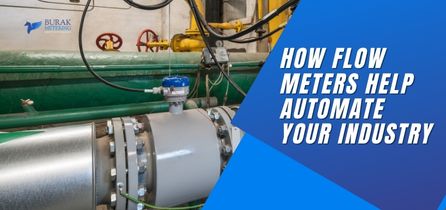 Phone
Phone

Flow meters are devices used to measure the flow rate or quantity of fluids passing through a system. They come in different types, including vortex, electromagnetic, ultrasonic, turbine, and more, each suitable for various industrial applications. Accurate flow measurement is crucial in industries to ensure smooth operations, avoid waste, and optimize processes.
As industries advance, modern flow meters are increasingly integrated into automated systems, enabling real-time data acquisition and operational control. This integration contributes significantly to enhancing efficiency, reducing costs, and improving safety.
Flow meters are integral to industrial process automation by providing real-time data that helps control systems function seamlessly. Automated systems, such as PLCs (Programmable Logic Controllers) and SCADA (Supervisory Control and Data Acquisition), rely on flow meter data to make instantaneous decisions.
For instance, a flow meter can measure the flow rate of a liquid in a pipeline, and if it drops below a predefined threshold, the PLC can automatically adjust the pump speed or valve opening to maintain a consistent flow rate. This ensures optimal operational conditions without requiring manual intervention, reducing human error.
Selecting the right flow meter depends on various factors such as fluid type, temperature, pressure, and required accuracy. It's essential to understand the specific needs of your process to choose the most suitable meter.
Here are a few common flow meter types and their characteristics:
Additionally, compatibility with automation systems (such as PLCs, SCADA, or IoT devices) is crucial for ensuring seamless integration into automated operations.
Burak Metering is a leader in providing advanced flow metering technology for automation. Their flow meters are designed with IoT and data analytics capabilities, ensuring that industries can not only monitor but also analyze their flow data to optimize performance.
With Burak Metering's products, companies can implement cutting-edge solutions in flow measurement, automating critical processes while maintaining high standards of accuracy and reliability. Burak Metering’s success stories include streamlined operations in industries like oil & gas, food & beverage, and pharmaceuticals, where flow meters have significantly contributed to operational efficiency.
The future of flow meters lies in their integration with Industry 4.0 technologies. Predictive maintenance powered by AI and data analytics will enable flow meters to predict and prevent failures before they occur, minimizing downtime and maintenance costs.
Wireless connectivity will also play a vital role in remote industrial sites, allowing for seamless monitoring and data transmission in hard-to-reach or hazardous areas. Furthermore, the growing focus on sustainability will drive demand for flow meters that optimize energy usage, ensuring that industries become more energy-efficient and environmentally friendly.
Flow meters are a vital component in industrial automation, providing accurate, real-time data that enhances control, safety, and efficiency. By automating processes with the help of flow meters, industries can achieve higher productivity, reduce waste, and lower costs.
Investing in automation-ready flow meter solutions from Burak Metering can lead to substantial operational improvements, ensuring long-term ROI. Contact Burak Metering today to explore solutions tailored to your automation needs.